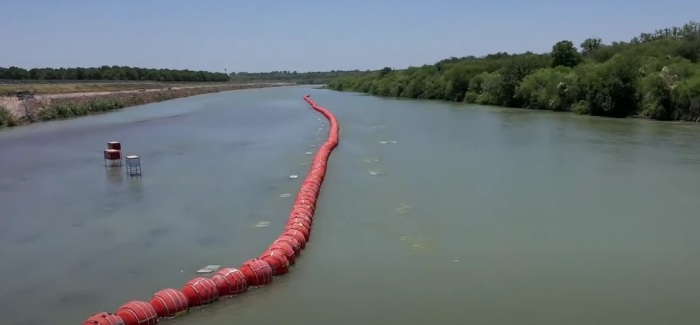Appeals court vacates ruling forcing Texas to remove floating barriers on Rio Grande

A federal appeals court has vacated an earlier decision ordering the state of Texas to remove a barrier that it placed along the Rio Grande to curb illegal border crossings from Mexico.
The 5th U.S. Circuit Court of Appeals issued an order on Wednesday confirming that the full court will hear oral arguments in the case of United States of America v. Greg Abbott.
As part of the per curiam order, the 5th Circuit vacated an earlier three-judge panel opinion from December upholding a lower court ruling against Texas and its floating barrier.
Last July, Gov. Greg Abbott instructed Texas officials to deploy the buoy barrier as a way to curb illegal entry into the United States as border towns are being overwhelmed by the increase of illegal border crossings in recent years.
The barrier is approximately 1,000 feet long and comprises large orange buoys fastened with metal cables and kept stable with underwater concrete blocks. The barrier also includes a stainless-steel mesh known as an "anti-dive net."
The U.S. Department of Justice contends that the buoy system violates the Rivers and Harbors Appropriation Act because they were placed without permission from the U.S. Army Corps of Engineers.
U.S. District Judge David Alan Ezra of the Western District of Texas, Austin Division, issued a preliminary injunction in September ordering Texas to remove the barrier.
Ezra, a Reagan appointee, wrote in his decision that Texas must get permission from federal authorities before building the buoy barrier.
Ezra rejected Texas' claims that the barrier was justified in stopping a wave of undocumented immigration, writing that "courts of appeals have uniformly declined to consider whether and when an 'invasion' occurs because of illegal immigration, as it 'involves matters of foreign policy and defense,' which the Constitution specifically commits to the federal government."
"Under this logic, once Texas decides, in its sole discretion, that it has been invaded, it is subject to no oversight of its 'chosen means of waging war'… Such a claim is breathtaking," continued Ezra.
In December, a three-judge 5th Circuit panel upheld the district court ruling in a 2-1 decision, with Circuit Judge Dana Douglas, a Biden appointee, authoring the majority opinion.
"All of the district court's findings of fact were well supported by the record, and its conclusion that the equities favor issuance of a preliminary injunction was not an abuse of discretion," wrote Douglas.
"The district court's factual findings were not clearly erroneous. Its grant of a preliminary injunction was not an abuse of discretion, as the United States carried its burden."
Circuit Judge Don Willett, a Trump appointee, authored a dissenting opinion, arguing that "the United States offers no substantiated record evidence that could justify a preliminary injunction."
"The United States cannot succeed on its RHA claim because it has not shown that this 1,000-foot segment of the Rio Grande is navigable," wrote Willett. "In reaching the opposite conclusion, the majority opinion and the district court resort to evidence that is foreclosed to us by a century-plus of case law."
"In sum, the district court's analysis of these equitable factors was unpersuasive, unsubstantiated, and incorrect — and the majority opinion repeats the error. The United States has not carried its burden."




























